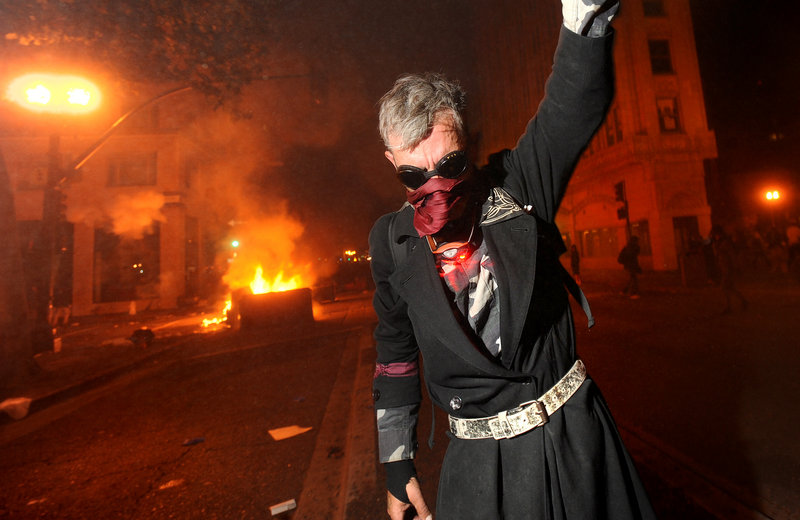OAKLAND, Calif. – Occupy Wall Street protesters had just a few hours to celebrate what they saw as their biggest victory so far: the peaceful shutdown of the nation’s fifth-busiest port. Then the rioting began.
A day after some protesters clashed with riot police, set fires and shattered windows in Oakland, demonstrators across the country condemned the violence and wondered whether it was a turn that would destroy their cause.
“They don’t speak for the majority of people who were here yesterday,” said Hadas Alterman, a college student who was gathering trash at a tent camp near Oakland City Hall. “That was an hour of action, and we were out here for 12 hours and it was peaceful.”
The protest outside the port, which reopened Thursday, represented an escalation in tactics as demonstrators targeted a major symbol of the nation’s commerce with peaceful rallies and sit-ins.
The violence that followed, however, raised questions about whether a movement with no organizational structure and no high-profile leaders can do anything to stop those they called troublemakers.
So far, few cities have reached the level of Oakland, a unique place with a long history of tensions between residents and police.
Bob Norkus at the Occupy Boston camp said the riots didn’t represent the broader movement and likely wouldn’t have a lasting effect on it, either. The movement is still evolving and mistakes are inevitable, he said.
It “has to be nonviolent, or else it will just end. We won’t get the support,” he said. “It doesn’t mean you can’t agitate people. But you can’t also be breaking windows and burning.”
Police in riot gear arrested more than 80 protesters in downtown Oakland, where bands of masked protesters took over a vacant building, erected roadblocks and threw chunks of concrete and firebombs. Five people and several officers were injured.
Chris Hedges, demonstrating at Goldman Sachs’ headquarters in New York, said the clashes in Oakland are a reminder to protesters that they should only respond peacefully to police actions.
“It’s awful. But police want people to break windows and set cars on fire, because it’s the kind of thing they know how to master — with force,” he said, before being led quietly away in handcuffs.
The far-flung movement challenging the world’s economic systems and distribution of wealth has gained momentum in recent weeks, with Oakland becoming a rallying point after an Iraq War veteran was injured in clashes with police last week.
Organizers called for a general strike Wednesday, and supporters in New York, Philadelphia, Los Angeles and elsewhere held smaller-scale demonstrations, some in solidarity with their Oakland counterparts.
Protesters in Oakland and in other cities viewed the day’s events and the port shutdown as a significant victory.
Police, who had little to no presence during the day, said about 7,000 people participated in largely peaceful demonstrations. There were a few incidents of vandalism at local banks and businesses.
A protest organizer in Chicago, Joshua Kaunert, said the shutdown was an “amazing” event for the movement, but didn’t want to speculate on what effect the violence would have. He said the lack of a formal leadership structure — and the emphasis on what he called a “true, direct democracy” — makes it difficult to weed out potential troublemakers.
“As a movement, it is definitely hard to keep that kind of element away, but that’s a double-edged sword,” Kaunert said. “If you want true, direct democracy, you’re going to have issues, regardless.”
Send questions/comments to the editors.



Success. Please wait for the page to reload. If the page does not reload within 5 seconds, please refresh the page.
Enter your email and password to access comments.
Hi, to comment on stories you must . This profile is in addition to your subscription and website login.
Already have a commenting profile? .
Invalid username/password.
Please check your email to confirm and complete your registration.
Only subscribers are eligible to post comments. Please subscribe or login first for digital access. Here’s why.
Use the form below to reset your password. When you've submitted your account email, we will send an email with a reset code.